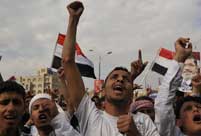WASHINGTON, Aug. 15 (Xinhua) -- The United States is in a tough position as Egypt unravels, and Washington's next move remains unknown after a bloody military crackdown on Muslim Brotherhood protesters in the streets of Cairo.
Hundreds were reportedly killed and thousands more wounded after Egyptian security officers steamrolled through Muslim Brotherhood demonstrations Wednesday in Cairo. Violence has spread from its center point in Cairo to other areas in the embattled nation, with reports of attacks on churches and police stations.
While U.S. President Barack Obama on Thursday condemned the violence and announced he would scrap joint exercises with Egypt's army slated for next month, he gave no indication of whether the United States would take any additional action.
Analysts said the White House is doing a tough balancing act by condemning the violence on one hand but making no mention of plans to cut military aid to the tumultuous country, opening itself up to criticism.
Indeed, some have accused the Obama administration of a muddled, unclear Egypt policy, as it continues to engage in what some have termed semantic jujitsu in a bid to avoid billing the recent military takeover as a coup. By law, doing so would force Washington to cut 1.3 billion U.S. dollars in aid to the beleaguered country.
Senator Rand Paul said Thursday in a statement that while the president condemns the military crackdown, "his administration continues to send billions of taxpayer dollars to help pay for it."
Wayne White, former deputy director of the State Department's Middle East Intelligence Office, told Xinhua that people "can expect condemnations (from the U.S.), private urgings for the military to back off, but not anything decisive to break with the military."
"In fact ... it is likely wealthy Arab Gulf states would compensate for aid lost elsewhere," White said.
Steven Bucci, director of the Allison Center for Foreign Policy Studies at the Heritage Foundation, said Washington may institute some changes.
"I could definitely see them (Washington) suddenly putting a whole bunch of new conditions on it (military aid)," he told Xinhua. But whether the United States will cut off military aid completely, "that's a tougher decision to make. But I think first you'll see some ... steps toward that - putting conditions on it, or cutting off certain programs and not others."
EGYPT'S MILITARY COULD OVERPLAY ITS HAND
White, now a scholar at the Middle East Institute, said the military's lashing out at the Brotherhood - plus junta-like steps such as the replacement of governors with generals earlier this week - is not only damaging to the reputation of the current regime, but most likely futile, as vast numbers of Brotherhood hardliners are willing to die.
Bucci said the Egyptian military is overplaying its hand. "That's going to cost them, and it may cost them the support of (the Obama) administration," he said.
The military "are basically taking the bait from the Muslim Brotherhood, who are trying to get the military to overreact, because they know what the world will say when they do that," Bucci added.
AN ELECTED LEADER ACTS UNDEMOCRATICALLY
White argued that Washington has done what he billed "a poor job" of describing why Egyptian President Mohammed Morsi was pushed out.
"The fact is that Morsi, when still quite popular and in office only a few months, seized extraordinary powers in late 2012 so he could override the Egyptian Supreme Court and ram through an Islamist-slanted national Constitution," he said.
White added that what he called an undemocratic power grab laid the groundwork for fear of Morsi's government in recent months. Indeed, the ousted president undertook a radical religious agenda, and some observers said the regime held as its goal the upholding of morality as defined by the Brotherhood's own religious views.
While some observers contended Egyptians should have waited until the next elections to oust the leader democratically, Bucci argued the country may not have had the ability to have an election after a full term of Muslim Brotherhood rule.
 Helicopters, tanks seen during China-Russia joint drill
Helicopters, tanks seen during China-Russia joint drill Conjoined twins separated in groundbreaking surgery
Conjoined twins separated in groundbreaking surgery Cristiano Ronaldo and his beautiful fans
Cristiano Ronaldo and his beautiful fans Morsi supporters demonstrate near Egyptian embassy in Yemen
Morsi supporters demonstrate near Egyptian embassy in Yemen Beijing Int'l Gifts, Premium & Houseware Exhibition opens
Beijing Int'l Gifts, Premium & Houseware Exhibition opens Weekly Sports Photos: A 'Bolt' of lightning flashes across the sky
Weekly Sports Photos: A 'Bolt' of lightning flashes across the sky Escort taskforce holds anti-hijacking drill
Escort taskforce holds anti-hijacking drill Egypt's clashes kill 525 so far
Egypt's clashes kill 525 so far Sex offenders prey on left-behind kids
Sex offenders prey on left-behind kids Jaguar Land Rover to recall 11,852 cars
Jaguar Land Rover to recall 11,852 cars Ballet Swan Lake rehearsed in Taipei
Ballet Swan Lake rehearsed in Taipei  The five Hutong areas of Beijing
The five Hutong areas of BeijingDay|Week|Month